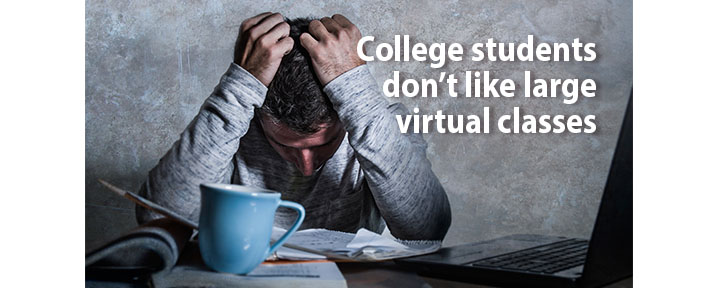
Wondering how college students fared during the 2nd semester of remote classes? 85% of freshmen, sophomores, and juniors reported that the pandemic has negatively affected their grades during Fall 2020. The survey included 232 public and private colleges.
Seems that students weren’t happy with the quality of virtual learning, and some even stated that free resources like Khan Academy were more helpful than remote classwork. Yikes! Others suffered from mental health issues around academic changes and coronavirus fears.
With all of the uncertainty with testing, vaccines, distancing requirements, and general safety precautions taken on college campuses, this is not surprising. Not sure what the new normal will be for college students on campuses in the near future, but I’m sure everyone is going to be much more aware of how viruses spread and what students will need to do to protect themselves.

Wondering how college students fared during the 2nd semester of remote classes? 85% of freshmen, sophomores, and juniors reported that the pandemic has negatively affected their grades during Fall 2020. The survey included 232 public and private colleges.
Seems that students weren’t happy with the quality of virtual learning, and some even stated that free resources like Khan Academy were more helpful than remote classwork. Yikes! Others suffered from mental health issues around academic changes and coronavirus fears.
With all of the uncertainty with testing, vaccines, distancing requirements, and general safety precautions taken on college campuses, this is not surprising. Not sure what the new normal will be for college students on campuses in the near future, but I’m sure everyone is going to be much more aware of how viruses spread and what students will need to do to protect themselves.
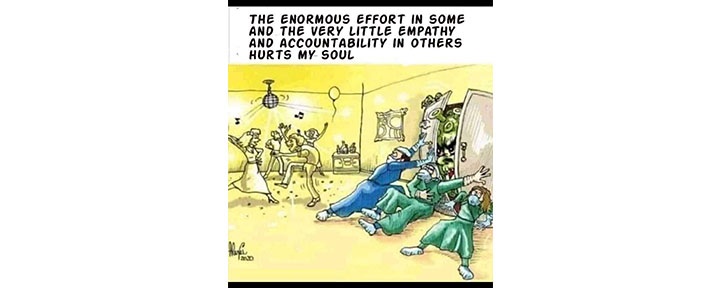
My daughter sent this to me. Seriously, when will they understand that their actions are putting everyone at risk of getting COVID-19?
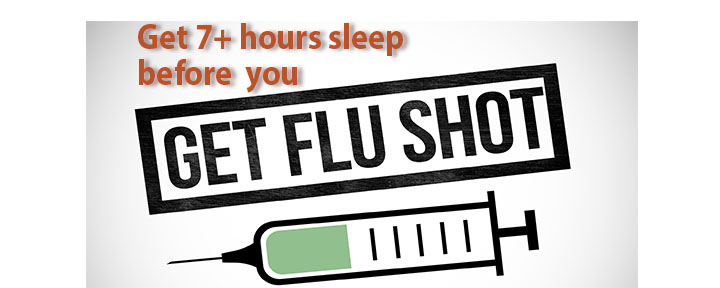
There is a lot of confusion about whether or not to get the coronavirus vaccine when it becomes available because it’s being rushed for political purposes. But I just read that whenever you do get a flu or COVID-19 shot, getting a good night’s sleep will increase its effectiveness. Good to know.
If you are sleep deprived during the week before you get a flu shot, you might get less than 50% of the normal antibody response than if you were well rested. That means that the flu shot might be ineffective.
We all know that sleep strengthens our immune systems. When we’re tired and run down, our bodies work overtime to repair and restore themselves on a cellular level while we sleep. People who sleep less than 7 hours per night are 3 times more likely to get sick with the common cold. Those who sleep less than 5 hours per night are 70% more likely to get pneumonia.
We should be sleeping between 7-10 hours per night. This can ward off depression and high blood pressure, and it’s linked to higher risk of dementia, diabetes, and cardiovascular disease.
So rest up before you get your flu shot this season!
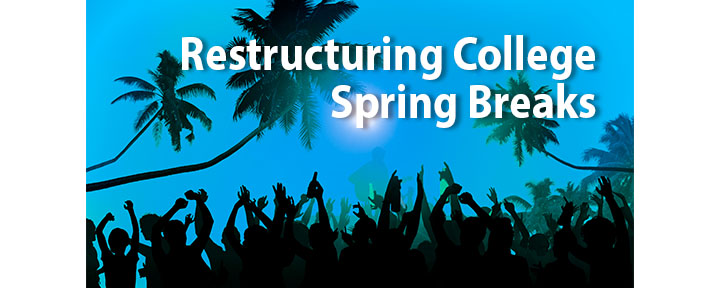
Looks like colleges are restructuring Spring Breaks for 2021. After last year’s spikes in COVID-19, many colleges have eliminated spring break entirely. Instead, some are starting semesters/quarters earlier or later. Others are spreading the 5 days (for spring break) over several weeks giving days off mid week or 3-day weekends. I think 3-day weekends may still entice college students to take a long weekend to splurge in a more intense and condensed version of their normal spring break excursions.
With just 3 months to the start of the new term in college, looks like many are continuing the same offerings they committed to for fall term. If they’re online, on campus, or hybrid, they’ll most likely continue the same for spring. So much is still unknown about how this pandemic will play out this fall and winter.
One thing we do know it that we need to stop spreading the coronavirus in order to move past this and recover. I think we should all shelter in place and quarantine as much as possible so this pandemic doesn’t drag on for months – or even years.
Looks like colleges are restructuring Spring Breaks for 2021. After last year’s spikes in COVID-19, many colleges have eliminated spring break entirely. Instead, some are starting semesters/quarters earlier or later. Others are spreading the 5 days (for spring break) over several weeks giving days off mid week or 3-day weekends. I think 3-day weekends may still entice college students to take a long weekend to splurge in a more intense and condensed version of their normal spring break excursions.
With just 3 months to the start of the new term in college, looks like many are continuing the same offerings they committed to for fall term. If they’re online, on campus, or hybrid, they’ll most likely continue the same for spring. So much is still unknown about how this pandemic will play out this fall and winter.
One thing we do know it that we need to stop spreading the coronavirus in order to move past this and recover. I think we should all shelter in place and quarantine as much as possible so this pandemic doesn’t drag on for months – or even years.
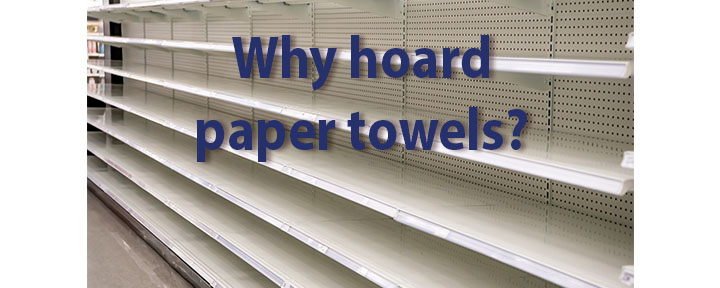
First it was PPE. Then it was toilet paper. Now it’s paper towels? I get there being a run on PPE – after all, it is the personal protective equipment that medical and front-line responders need to stay safe while doing their jobs. I never understood why toilet paper became scarce, and now paper towels?
I have a solution: DON’T USE PAPER TOWELS AT ALL!
Paper towels are the most wasteful product invented by companies like Proctor and Gamble. Before their relatively recent invention, we used cloth towels. They’re much more absorbent and stronger than any paper towel – even the “Quicker Picker Upper.” They can be washed and dried with your towels, and then reused hundreds of times. See my blog about Cloth vs Paper Towels: No Contest!
I even carry a cloth towel in my purse and in my car so I have one everywhere I go. If public restrooms don’t have an air dryer, I just pull out my cloth towel and wipe my hands. After touching the faucet (ooh, cooties!), I safely dry my hands.
Check out my YouTube video on simple ways to reduce paper waste. So if people start hoarding paper towels, just cut up old cloth towels and you’ll be all set for 10 years!
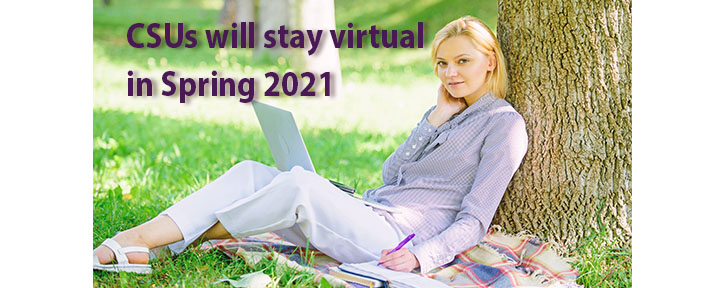
The California State University (CSU) system has announced that their all of their campuses will continue to have remote learning for spring semester 2021. I’m glad to hear that they have made this decision and have communicated their plans with their students, faculty, and staff so everyone can make plans accordingly. It’s the respectful and responsible thing to do. I wish all campuses would do the same. The sooner we stop the spread of the coronavirus, the sooner we can get back to school and work! It’s really that simple.
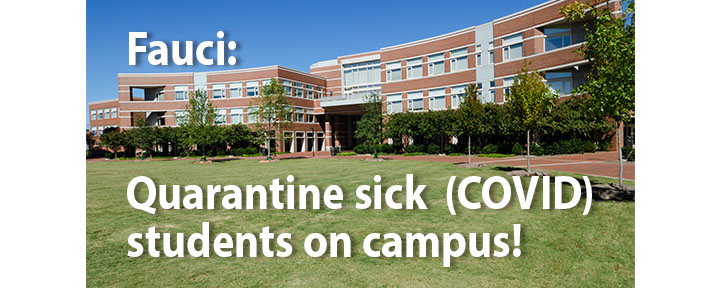
When college kids get COVID-19 and they’re hundreds or thousands of miles from home, they’re going to want to be with their families. Being sick and homesick at the same time is just awful. They’ll want Mom’s chicken soup and other comfort foods that only a mother can give.
But Dr. Fauci says that colleges should NOT send students sick with COVID-19 back home. Instead colleges are now required to take care of the sick students by quarantining them and giving them medical attention. And they should! Imagine what would happen if thousands of students with COVID-19 travelled across city, state, or even continental lines? The college students alone could create the 2nd wave.
Many of the colleges that opened up their campuses to students this fall made these decisions based on the financial health of the institution. Some colleges share the responsibility of managing dorms and food services with third parties or partners. With pressure from business partners to fill the dorms, many colleges invited students back for classes this fall. Losing room and board from students while paying for high costs of dorm remodels to protect students when they return to campus could be a financial nightmare.
There are still so many unknowns about the spread, treatment, and prevention. Until we fully understand the wrath and potential of this virus, I wish everyone would stay home. The more cases that pop and surge on college campuses, surrounding neighborhoods, and back in students’ home towns, the longer it will take to contain this pandemic.
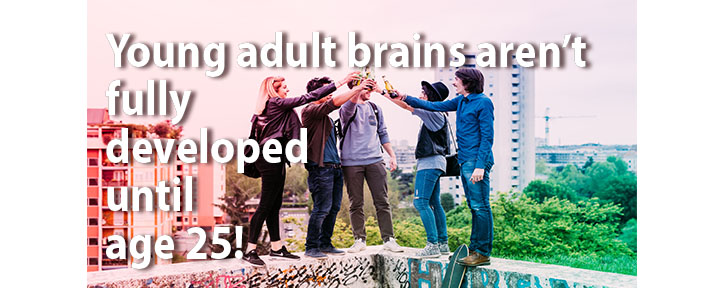
We have become an entitled society, so it should be no surprise that college students are disregarding COVID-19 guidelines that they previously agreed to in order to have the luxury of living in the dorms and taking classes on campus. Colleges that invited students back to campus for fall semester over the past 2 weeks are seeing a surge in COVID-19 cases. From frat and sorority parties to large gathering on campus to bar-hopping, many college students think they are invincible and that they don’t need to heed the rules set by the college administration.
As a result, colleges are scolding groups of students for their reckless and selfish behavior. Some colleges are closing up dorms and sending students home. One thing for sure: college students can and will get COVID if they don’t seriously change the way they socialize and study.
Laurence Steinberg, a psychology professor at Temple University and expert on adolescent behavior says that young adults tend to think more of “immediate rewards rather than long-term consequences.” They need to socialize and even if they understand the severe consequences of breaking the COVID-19 rules, they don’t think they’ll get caught. Sound familiar?
At Boston University, students are permitted to have small gatherings with friends, but warned to not share drinks, to social distance, and to use hand sanitizer. They prefer to have phone sex, keep consistent hook-up buddies, and discuss COVID-19 risks. It seems that Gen Z students have the “f*ck it” attitude about their personal responsibility to other students and the community.
According to the Journal of Adolescent Health, the young adult’s prefrontal cortex – the part of the brain that is responsible for rational thinking — is not fully developed until they reach age 25. That’s 3 years after they graduate from college. So why would we put young adults in a college setting where they need to restrain themselves without their parents and teachers overseeing their activities? We’re simply setting them up to get COVID and to infect their friends, professors, college staff, and the communities they live in.
Maybe we should all stay home until we get the coronavirus under control, have safe treatment plans, and have tested vaccines that can save lives.
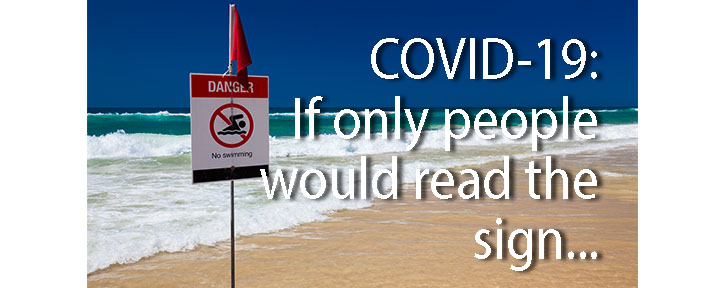
I’ve been confused by the recent “spikes” in COVID-19 cases around the world — wondering if they were an early “wave” that we were expecting this fall. Check out this analogy that helps make sense of the spread:
Why did the second wave of COVID-19 start so soon? Everyone said it wouldn’t happen until the fall. Does that mean the fall one will be a third wave? How many waves will there be? Who can we trust now?
This whole “wave” thing is dreadfully misunderstood. For the moment, forget about “waves” and think, instead, in terms of swimming in shark-infested waters.
You are at the beach, with hundreds or thousands of others, enjoying the water, body-surfing, and having a good time.
All of a sudden, the lifeguards spot sharks, and several swimmers are killed. Body parts bob in the ocean and wash up on shore.
The coast guard observes entire schools of sharks, and swimmers are warned NOT to go into the ocean. But, a few people ignore the warning and take their chances by swimming in the ocean. Several more people are mutilated by these sharks, and then more sharks appear because the water is now rich with food (blood and body parts).
Finally, the beach is closed and nobody is allowed in the water. Then, shark attacks go down because nobody is swimming in the water. People are staying on home or staying far away from the shoreline.
But, the sharks are still there. Nobody did anything to eliminate or get rid of the sharks, right?
With no casualties for days, or even weeks, swimmers go to the beach to enjoy the water, bodysurf, and have a good time. Note: “Beach Closed” signs were still posted but the swimmers decided to go ahead and enter the water.
Guess what happens?
The sharks maime and kill them! Lots of them.
Why? Because people went back into the water before it was safe to do so.
Now think COVID-19. We haven’t found a way to stop the coronavirus. We have no vaccine. We have no cure. The virus is still out there and still killing people. If you go out and expose yourself to the coronavirus, you are increasing the chance of getting sick or dying.
The only “wave” is the wave of PEOPLE who disregard warnings to stay home, keep a safe distance from others, and wear a mask because they think the coronavirus is under control. And every time they go out, more people get sick, spread the virus to others, and die.
The virus doesn’t “do” waves; PEOPLE DO.
Think Florida, Texas, and California. These states are seeing surges in numbers of COVID-19 because PEOPLE are disregarding the warnings from scientists and doctors.
Until we know how to kill the coronavirus or have an effective vaccine, our only defense is to stay home, keep a safe distance, and wear a mask — until the virus has no more human food.
I paraphrased John Geare’s brilliant analogy.
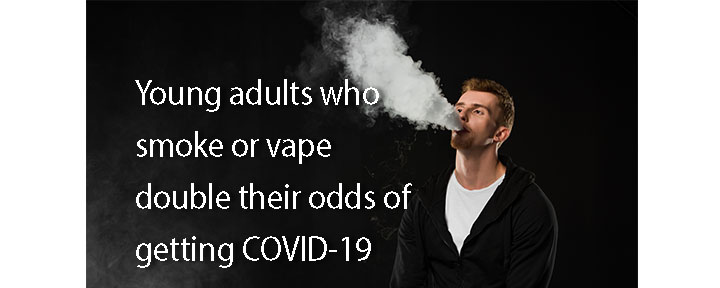
Get this message out to the teens and young adults who think they are invincible and won’t get COVID-19. One-third of young adults may be at risk of getting seriously sick with COVID-19 – especially if they smoke or vape. For young men, smoking or vaping can more than DOUBLE the potential of being hospitalized, needing intensive care, or dying from the virus. For young women, it could increase the possibility about 1.5 times.
With young people partying during spring breaks, summer vacations, 4th of July and more, they are now driving the nation’s surge in COVID cases. Kids between 18-29 years old are filling more hospital beds today than they did at the start of the pandemic. There’s been a 300% increase in hospitalizations of youth between mid-April and late June.
In California, new coronavirus cases among young people under age 35 surged by 73% at the end of June (compared to the first of June). During this same time period, infections for people over 50 rose only 43% — showing that smoking/vaping youth are at higher risk than people over 50.
I hope that youth will stop smoking and vaping to increase their chances of making it through this pandemic. This will also improve their overall health and life expectancy.
